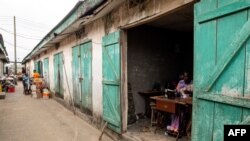A recent wave of abductions in Nigeria is raising fear across the country. Unlike kidnappings which take on political dimensions — such as those involving militants who agitate against oil companies in the south, or Islamic group Boko Haram in the north — this wave spans every region, and is driven largely by economic hardship.
Thirty-two-year-old Olumide Peter was returning from an evening class at the International Institute of Journalism in Abuja when several men hijacked his car and took him away.
"I tried to maneuver myself to open the door; they overpowered me," Olumide said. "They hit me with a spanner [wrench] and some vehicle tools and immediately the guy came out with a gun. He said he's going to kill me."
The kidnappers reportedly held Olumide for days and tortured him until an unknown amount of money was paid to secure his freedom.
Nigeria is seeing a wave of kidnapping that is cutting across every socioeconomic class.
According to police, 685 kidnappings occurred nationwide in the first quarter of the year, an average of seven per day. Kidnappers demand between $1,000 to $150,000 as ransom, depending on the financial resources of the victims.
In the past, many abductions were traced to militants in the south agitating against oil companies, or the Islamist militant group Boko Haram in the north.
Security experts like Senator Iroegbu say the recent abductions are the result of Nigeria's economic hardships and poverty.
"In fact, most of us saw it coming because there's hunger in the land and Nigeria has been on economic doldrums for years now and crimes will increase definitely because people will become more desperate," Iroegbu said.
Abduction response team
The Nigerian government responded to the wave of kidnappings by setting up an abduction response team.
Police spokesperson Frank Mbah says the team is making progress.
"There's actually a decrease, a significant drop in the rate of kidnapping in Nigeria and this drop began to manifest itself soon after the launch of Operation Puff Adder, a very lethal, functional, effective and efficient anti-crime strategy," he said.
But Iroegbu says the police force may be unprepared for the tasks ahead.
"The number of our police force is not near to the United Nations standard per 500 people or 1,000 people within a space," he said. "So we're short of manpower, intelligence, communal corporation that we need."
While security officials continue to crack down on perpetrators, victims like Olumide move on with their lives, looking over their shoulders, aware that they could be abducted again.







